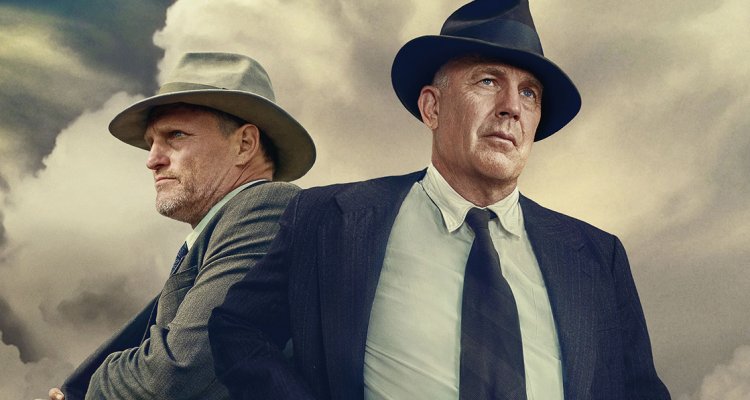Making a film about the ex-Texas Rangers who took down Bonnie Parker and Clyde Barrow on a Louisiana backroad feels so misguided given its inherently incongruent to the subversive nature of Arthur Penn’s seminal film about these outlaws. The groundbreaking “Bonnie and Clyde” was a molotov cocktail to the middle of the studio system in 1967, and its exploration of that blurry lines between sex and violence, the sexual self-denials that leads human beings to satisfy their urges elsewhere, was truly revolutionary and confrontational at the time. To sand off those edges and tell the story from the flipside perspective, is almost perversely bold: what if we took this story, removed every transgressive edge that made this story a cinematic classic, and then told it from the perspective of boring, old white men who really don’t have such internal emotional conflicts? Who decides the normcore version of a radical story is worth telling? Who does that?? There’s no denying that Frank Hamer and Maney Gault are heroes for bringing down the most notorious criminals of their day, but does their story make for an interesting cinematic endeavor like “Bonnie and Clyde?”
READ MORE: The 100 Most Anticipated Films Of 2019
That question is a metatextual layer to John Lee Hancock‘s “The Highwaymen” that admittedly is the most interesting thing the tedious, by-the-book drama has to offer. After a deadly prison break in Eastham Prison in 1934, Bonnie and Clyde’s murderous spree has left Governor Ma Ferguson (Kathy Bates) at her wit’s end. Much to her chagrin, the desperate solution to her problems is to reinstate the Texas Rangers, led by Hamer (Kevin Costner)— retired and sucked back in by the mechanics of the “one last job” narrative— and Gault (Woody Harrelson)—suffering from PTSD and living in a soon-to-be-foreclosed-on rural shack—to bring down the infamous duo. Throughout the film, there’s imagery of young people dressed up like Bonnie and Clyde, with posters and water towers that explicitly cheer on these unlikely anti-heroes. The mindset of Hamer and Gault is like an intersection between the existential dread of losing a grip on the current state of the world a la “No Country for Old Men” and the more simplistic “Get off my lawn” mentality of Clint Eastwood’s “Gran Torino.” Like Bonnie and Clyde, Hamer and Gault have committed violent acts—mostly in the name of the law—and they feel the weight and consequences of their action. The world is changing, perhaps one of the only other interesting elements of the film, and these two aging men not only lack an understanding of the Bonnie and Clyde and the phenomenon, and why people would root on outlaws, the also a sense of envy about their celebrity. When Bonnie and Clyde are mourned in the streets after the standoff (spoilers for real life), Hamer and Gault watch stoically, knowing that their story will always come second-banana to theirs, and will continue to carry the burden of their actions to the grave. In this regard, it’s not like “The Highwaymen” isn’t very aware of “Bonnie & Clyde” and in some ways, is playing against it. But never, of course, to any benefit to itself.
READ MORE: SXSW Film Festival Preview: 16 Movies To See
Costner and Harrelson are two actors who are no strangers to navigating the rough terrain of the west and playing the kind of gruff-and-tough heroes who understand that “hero” is often a thankless label. The two share an easy chemistry, though for two highly charismatic performers, there is something unromantic and dire about their performances and it makes you wish they had a better film around them. “The Highwaymen” moves at the glacial pace of a revisionist western, but also at the insistence that it’s a police procedural, and all of the latter elements are extremely perfunctory and stop the strong leads dead in their tracks. To drive home that theme about how infamy gives more leeway to fame and to be a true counterpoint to “Bonnie and Clyde,” Hancock needs to match that fire and urgency from the lawmen’s perspective. But he does the opposite mostly, and when a sense of immediacy arrives, it comes in small spurts, precisely the first ten minutes and last fifteen. Everything in the center is working at odds with the goodwill that Costner and Harrelson are doing their best to build up.
“The Highwaymen” does at least match the original film’s violence, and Hancock stages some decent action beats, which is surprising given his extensive resume of sentimental melodramas, but it doesn’t have much else going for it. The cinematography is confusingly both intentional in its lack of romanticism in this rough Texas terrain and a flat eyesore, seemingly engineered for viewing on an iPad or whatever unremarkable screen a Netflix viewer will watch it on.
In fact, everyone has lost the right to complain about the gorgeous digital cinematography in Michael Mann’s “Public Enemies.” But, credit where credit is due, like a Mann film, the sound mixing is just outstanding. The gunshots are visceral, and you can feel the weight of them every time they are fired, and yeah, I’m kind of reaching for some positive straws, aren’t I?
Despite some surprising subtext and two strong leads, “The Highwaymen” is, for lack of a better term, a normie dadcore slog that Ted Cruz voters in Texas will likely adore as directed by the cinematic equivalent of golf. Had the film had leaned heavier into the existentially-weary psyche of its two lead performers, or tightened up the pacing, or made us care about the police procedurals that occupy a large chunk of the film’s running time, maybe it could have been a fascinating double-feature with “Bonnie and Clyde.” As it stands now, “The Highwaymen” arguably does just enough legwork to justify its existence, but good luck enduring it. [C-]
Click here for more of our coverage from SXSW 2019.

